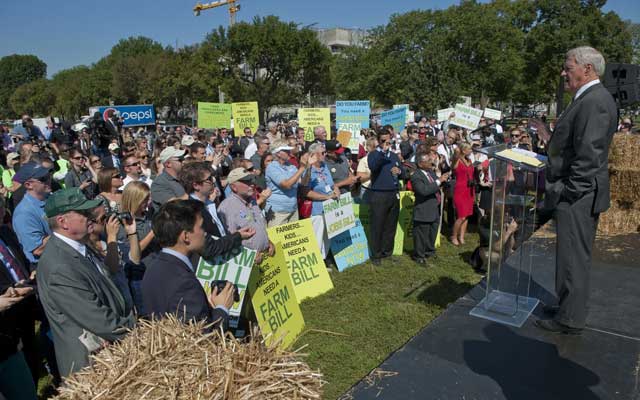House Farm Bill Conferees Will Allegedly Agree to Controversial Property Provision
Daren Bakst /
According to a recent Politico article (subscription required), Representative Collin Peterson (D–MN), ranking member of the House Agriculture Committee, claimed that the House farm bill conferees are expected to give in to the Senate on a controversial provision involving how farmers use their land:
Peterson said there’s already some agreement between the principal four conferees. It hasn’t been formalized, he said, but there is a general recognition that the House conferees will agree to a Senate provision that requires farmers to apply [government]-approved conservation practices [conservation compliance] to their fields in order to qualify for subsidized crop insurance.
Conservation compliance would place two demands on farmers in return for crop insurance benefits:
- Farmers could cultivate highly erodible land only if they developed government-approved conservation systems to address soil erosion, and
- They could not convert wetlands to crop production.
This news, if true, will certainly come as a shock to farmers, especially since the chairman of the House Agriculture Committee, Representative Frank Lucas (R–OK), who is also one of the principal four conferees, has been such a vocal critic of this provision.
Excessive subsidies in the crop insurance program can have an impact on decisions made by farmers. When there’s little to no risk, some farmers may make decisions regarding their land that they otherwise wouldn’t make, including decisions that allegedly may not be environmentally friendly.
However, these market distortions exist because of the crop insurance program. The solution is to eliminate these subsidies that create the problems in the first place, not to impose more governmental requirements on how farmers can use their land.
By taking taxpayer dollars, though, farmers have accepted that there will be conditions on receipt of the funds. This doesn’t justify tying crop insurance to private property decisions, but it does explain why farmers would have to deal with this level of government intrusion in the first place.
As existing policy forces taxpayers to pay for an astonishing 62 percent of the premium subsidies for crop insurance, the argument to tie conservation compliance to crop insurance is made much easier because of the potential market distortions from crop insurance.
Making matters worse, the House and Senate farm bills go even further by shifting more risk to taxpayers. For example, the bills create a new shallow-loss program that would cover even minor losses for farmers, effectively guaranteeing revenue and eliminating almost all risk.
As the American Farm Bureau Federation wrote regarding shallow-loss programs:
Our biggest concern is that by reducing the risk of shallow losses, farmers may be encouraged to take on more risk than they would in response to market signals alone. This is basically analogous to the classic moral hazard problem of insurance. Insured individuals may engage in riskier behavior than they would if they weren’t insured.
The only way these distortions will be eliminated is if the subsidies are eliminated. Modest reforms, such as a cap on the total amount of premium subsidies received, would at least reduce any distortions. Arguably, for farmers, such modest reforms could help minimize the justification for government intrusion into their property decisions.

